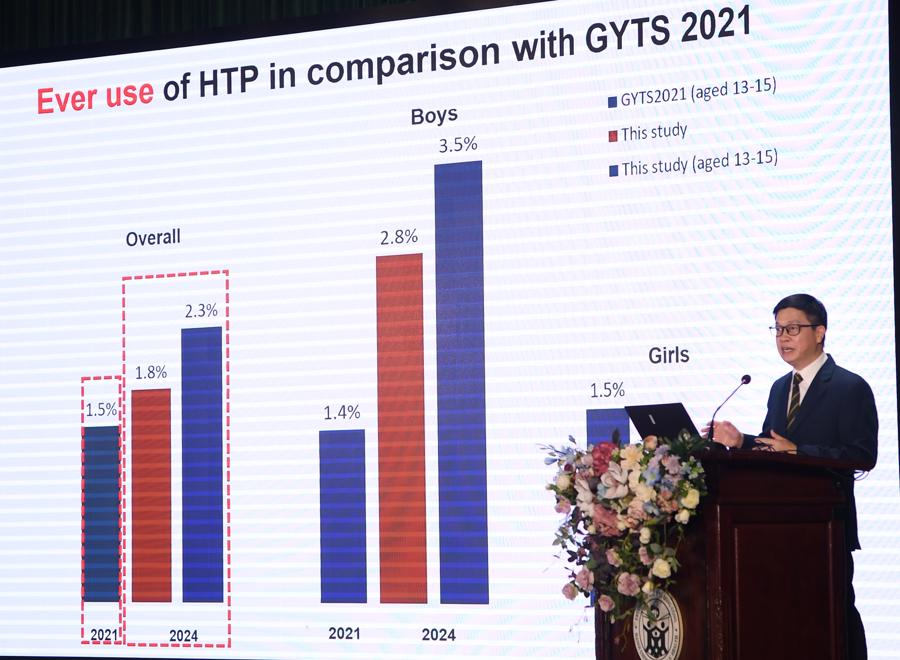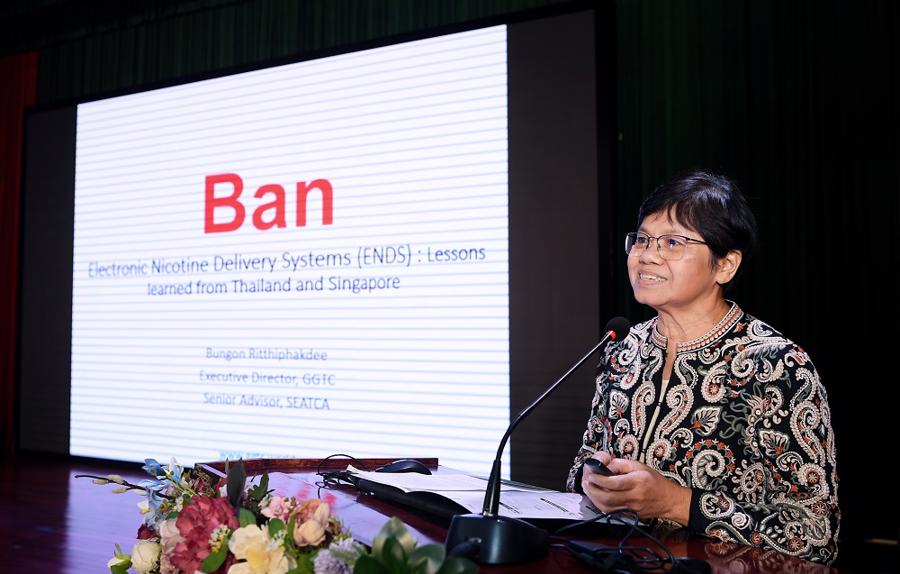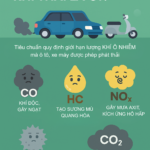This information is shared from the InnovaConnect workshop on the topic “Preventing the Harmful Effects of New Tobacco: Scientific Evidence and Experiences in Vietnam and the World,” which was recently held at the University of Public Health (UPH). The workshop is part of the InnovaConnect series organized by the VinFuture Foundation in collaboration with UPH, with the participation of nearly 500 guests, including leading experts from Vietnam and abroad.
“E-CIGARETTES AND HEATED TOBACCO CREATE A NEW GENERATION OF NICOTINE ADDICTION”
During the period of October-December 2023, a random sample study led by Prof. Hoang Van Minh, Principal of UPH, was conducted on 3,801 students from grades 6 to 12 in 11 provinces and cities in Vietnam. The results showed that 96.2% and 37.8% of students were aware of the existence of e-cigarettes and heated tobacco, respectively. Among them, 14% had ever tried e-cigarettes, and 7% were current users within the past 30 days. The rates for heated tobacco were 1.8% and 1.0%, respectively.
The prevalence of e-cigarette and heated tobacco use among Vietnamese youth is high, especially when compared to the rates of traditional cigarette use. Prof. Minh shared concerning findings from the information collected by his research group.
“This is a worrying trend, as it could undo the efforts made over the years to control tobacco use among adolescents. Moreover, the high rates among both experimental and current users of e-cigarettes and heated tobacco could even lead to an increase in the use of traditional cigarettes in the future. The addiction to nicotine formed during e-cigarette use can lead to a ‘transition’ to traditional tobacco products,” emphasized Prof. Minh.

Not only in Vietnam, but the prevalence of new tobacco product use among adolescents has also been rising rapidly in many countries over the past decade. The appeal of e-cigarettes and heated tobacco devices with trendy designs, diverse flavors, and sophisticated advertising campaigns has led many people, especially teenagers, to mistakenly believe that these products are safer than traditional cigarettes.
“Tobacco companies are using subtle advertising tactics to attract youth, especially through social media. They create attractive images, use celebrities to promote their products, and provide misleading information about the safety of e-cigarettes and heated tobacco,” said Associate Prof. Becky Freeman, an expert from the School of Public Health at the University of Sydney, Australia.

Concurring with this view, Ms. Bungon Ritthiphakdee, Executive Director of the Global Center for Good Governance in Tobacco Control (GGTC, Thailand), stated that the tobacco industry is trying to circumvent regulations by introducing new products such as e-cigarettes and heated tobacco to counter the increasingly strict regulations on traditional cigarettes.
“E-cigarettes and heated tobacco also contain addictive nicotine and can create a new generation addicted to nicotine,” she warned.
The survey results from Prof. Minh and his team also showed that many students still had misconceptions about the harms of these new tobacco products, believing that they were safer or less harmful than traditional cigarettes. 23.5% of students did not perceive the potential risks of e-cigarettes, and this figure was even higher for heated tobacco (43.2%).
“This has led to many students being willing to experiment with and use these products without anticipating the associated harms,” Prof. Minh said.
THE URGENT NEED TO RAISE COMMUNITY AWARENESS
In reality, these new tobacco products can have negative impacts on health, especially the developing brains of adolescents. The global health community has also recorded some cases of lung injury associated with e-cigarettes, known as EVALI.
Prof. Minh emphasized the need for immediate action, formulating, and enforcing strict control policies for these products.
According to Prof. Minh, community health campaigns play a crucial role in addressing the lack of knowledge about the harms of e-cigarettes and heated tobacco. Additionally, community awareness campaigns can create a strong wave of support for tobacco control policies, dispelling the notion that smoking is “cool” or “masculine.”
Currently, at least 34 countries and territories worldwide have implemented a complete ban on e-cigarette products, and 11 countries have banned the sale of heated tobacco. For example, in Singapore, since February 2018, the government has entirely prohibited the purchase, use, and possession of new tobacco products such as e-cigarettes, shisha, and smokeless tobacco.
“The Singapore government wants to protect its future generations, and that is why they decided to ban new tobacco products like e-cigarettes and heated tobacco entirely,” shared Ms. Ritthiphakdee.

Sharing the experience from Australia, Assoc. Prof. Freeman mentioned that the daily smoking rate in the country is now below 10%. However, achieving this required a comprehensive multi-faceted approach. One effective solution is restricting the sale of e-cigarettes to pharmacies with strict regulations.
“Young people will no longer be able to easily purchase these products at convenience stores. This model has significantly reduced the rate of e-cigarette use among youth,” said Assoc. Prof. Freeman.
InnovaConnect is the latest initiative by the VinFuture Foundation to build on the success of the “VinFuture Future Dialogue” series from the 2023 VinFuture season.
The distinctive feature of the InnovaConnect series is the collaborative discussions and in-depth scientific workshops held directly in Vietnam, with the participation of leading professors, doctors, and experts worldwide and Vietnam. This affirms VinFuture’s role as a solid bridge to lay the foundation for the sustainable development of science and technology in Vietnam.




































